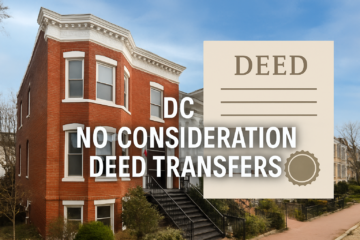Transferring property can be a complex and daunting process. Whether you’re buying, selling, or inheriting, asking the right questions can help you navigate the transaction smoothly and make informed decisions. In this guide, we’ll explore 15 questions before a property transfer and the key items you should address before finalizing a property transfer.
1. Understanding the Reason for the Transfer
Determine why the property is being transferred. Understanding the motivation behind the transfer can reveal potential issues or advantages. Common reasons for property transfers include sales, inheritance, or gifts. Each reason may carry different legal and tax implications that need to be navigated with precision. For example, when transferring property through inheritance, being aware of the estate’s implications is essential. Understanding the motivation behind the transfer could potentially indicate hidden urgencies or opportunities, such as a seller needing quick cash or an estate requiring efficient distribution among heirs.
2. Assessing the Property’s Current Value
Have a clear understanding of the property’s market value. It’s crucial to consult a real estate expert or appraiser to avoid overpaying or underselling a property. This step ensures that all negotiations are backed by solid data and fair assessments. A misjudged property value could result in financial losses during a sale or inflated taxation upon inheritance. Explore similar property sales in the area through estate databases to gain a broader understanding of regional trends.
3. Investigating Property Liens and Encumbrances
Check for any existing liens, claims, or encumbrances on the property, as these can affect ownership rights and capacity to transfer. This involves understanding both the history and current status of the property in local and municipal records. Addressing such matters with an experienced deed lawyer can save you from officiating transfers that may incur unforeseen legal liabilities.
4. Clarifying Zoning and Land Use Regulations
Understand the zoning laws and land use regulations applicable to the property to avoid legal issues and maximize potential use. Zoning restrictions dictate how the land can be used, influencing potential renovations, business endeavors, or consequent sale value. It’s wise to consult the local municipal office or a zoning specialist for exact regulations concerning commercial, residential, or agricultural uses. Misjudging these attributes might render future projects legally or economically infeasible.
5. Examining Title Ownership
Ensure the title of the property is clear and that the person transferring the property has legitimate ownership. Enlist a reliable title company to conduct a thorough search to verify whether the property title is free from legal hazards and accurately documented in the public record. Aspects like ownership clarity or previous unrecorded transfers can impact your purchase or ownership rights if not assiduously investigated. For further guidance, refer to our dedicated section on deed transfers.
6. Determining Property Taxes and Obligations
Inquire about current and past property tax obligations to ensure all dues are settled before the transfer. Understanding the property’s tax history, including any potential liabilities such as back taxes or assessments, is crucial to avoid unexpected financial burdens post-transfer. Research indicates property taxes can entail varying rates based on jurisdiction and property category, a key consideration when forecasting budgets for any real estate transfer.
7. Reviewing Past Maintenance and Repairs
Request records of any past maintenance or modifications made to the property to understand its current condition. Detailed records reveal the building’s performance and potential irregularities in structural components or systems such as roofing or electrical systems. It’s beneficial to hire a professional inspector to uncover discrepancies that may affect valuation or safety, ensuring you make an informed offer on a reliable premise.
8. Identifying Utilities and Infrastructure
Check on the utilities and infrastructure available with the property, including water, electricity, and internet services. For investment properties, awareness of available utilities can drastically influence financial and structural planning. Locations that support newer and more efficient systems could present advantages over older, outdated developments. Be sure to evaluate the infrastructure conditions relative to prospective development goals, utility costs, and potential renovation needs.
9. Confirming Legal Compliance
Verify that the property complies with all applicable local laws, building codes, and regulation standards. Non-compliance issues may lead to hefty fines or restrictive covenants that could thwart prospective innovation. Due diligence can highlight restoration requirements anticipated during a legal approval process, thus securing a seamless transition into the necessary compliance state.
10. Evaluating Environmental Concerns
Consider any environmental factors like flood zones, contamination, or protected land statuses that may impact the property. An environmental assessment is valuable in identifying potential regions prone to ecological concerns, preventing substantial liabilities due to remedial mandates. Understanding terrain and ecological constraints sets purchaser expectations realistically, facilitating informed decisions avoiding ecological compliance transgressions.
11. Understanding Covenants and Easements
Review any covenants or easements governing the property that may restrict its use or require specific maintenance obligations. Ignorance of these legal stipulations could hinder potential utility or restrict developmental aspirations. Engaging with local officials or reviewing documentation on easements can clear misconceptions that may be involved in utility setup, infrastructure allowances, or conveyance between parties.
12. Recognizing Transfer Costs and Fees
Acknowledging the associated costs, including legal fees, transfer taxes, and any other financial responsibilities. Financial planning around these fees can provide a transparent cost forecast. Partnering with law firms experienced in real estate, such as the Gentile Property Law Office, can prevent unforeseen monetary commitments and ensure prudence throughout the financial aspect of property transactions.
13. Examining Financial Arrangements
Clarify payment methods and financial arrangements involved in the transfer to ensure all parties are agreed. Terms like earnest money or payment plans should be explicitly discussed, confirmed, and documented to sidestep disputes post-agreement. When financing, aligning your acquisition budget with payment terms cultivates fiscal health, aligning financial considerations with parallel contextual investment strategies.
14. Synchronizing on Transfer Timeline
Set a clear timeline for the transfer process, including any conditions or deadlines that must be met prior to finalization. Timeliness ensures that emergent tasks surface effectively compared to delays that might foster unforeseen legal obstructions. Challenges stemming from opaque timelines can hinder the process; hence, utilities, stakeholders, and regulatory approvals should coordinate within a synchronized schedule.
15. Finalizing and Reviewing Contracts
Before signing, scrutinize all legal documents and contracts with a real estate lawyer to ensure accuracy and protect your interests. Unskilled readings may overlook clauses detrimental to agreements, yet they often become crucial leverage points. Familiarity with regular contract language, consulting legal expertise in approaching property transfer contracts re-affirms decisions and helps avoid ambiguities or errors that might later mutate into disputes.



0 Comments